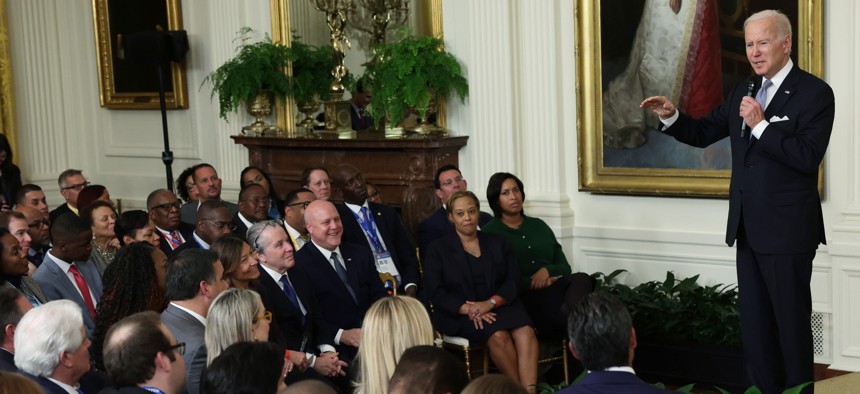What the Mayors Discussed When They Met With Biden

President Joe Biden speaks to mayors from across the country during an event at the East Room of the White House on January 20, 2023 in Washington, DC. Alex Wong / Getty Images
Immigration and how cities are spending federal funding were among the topics that came up during the White House meeting.
The head of the main group representing the nation’s mayors on Friday urged President Biden to take a broad approach in dealing with the national migrant crisis, calling for more than just immediate funding for cities to handle an influx of immigrants.
“There needs to be a solution to the humanitarian and security crisis on our border,” Miami Mayor Francis Suarez, president of the U.S. Conference of Mayors, said during an appearance at the White House with Biden. Suarez called on Biden to look for ways to address the “core drivers, not just the symptoms” when it comes to the surge of immigrants arriving in U.S. cities.
The meeting between the city leaders and the president came at the end of the mayors’ annual winter gathering in Washington, D.C.
New York City Mayor Eric Adams has drawn attention in recent days for pressuring the administration to provide more funding for cities like his to house and care for migrants—money that would come atop $800 million included in a recent federal spending bill.
But funding wasn’t the primary focus when the mayors met with Biden. Instead, the emphasis was on the need for comprehensive immigration reform, Andrew Ginther, mayor of Columbus, Ohio and the Conference of Mayors’ second-vice president, said in an interview.
John Giles, the mayor of Mesa, Arizona and co-chair of the conference’s immigration task force, also told Route Fifty that requests for additional funding to help with immigration weren’t discussed in detail at the White House. Giles said the mayors did raise the funding issue with Homeland Security Secretary Alejandro Mayorkas during a private meeting earlier in the week.
“I got the impression he needed to be convinced that this was a serious issue,” Giles said when asked how Mayorkas responded. Giles said he and Phoenix Mayor Kate Gallego invited Mayorkas to tour locations in their cities where migrants are being housed.
Mayors brought up a number of other issues in their meeting with Biden, including the need for law enforcement funding and praising him for the passage of last year’s CHIPS and Science Act, which is meant to boost semiconductor production around the country. The legislation could “turn the Rust Belt into the new Silicon Valley,” Ginther said at the appearance with Biden.
Suarez also encouraged the administration to continue helping cities deal with crime and provide resources beyond $4.4 billion for local law enforcement in the $1.7 trillion spending bill Biden signed last month.
Suarez, a Republican, repeated his call for Biden to stop supporting an end to cash bail passed in some states, which, the mayor said, “seems to be contributing to the spike in violent crime in our cities.”
Biden, in his remarks, said the answer to addressing the nation’s crime problem “is not to defund the police” but to increase policing in a way that is “equitable.”
The president, asked by St. Louis Mayor Tishaura Jones, what cities can do to improve the nation’s economy, suggested mayors continue trying to improve education. He pointed to innovative pre-K programs and apprenticeships as positive steps.
Biden, who during his speech noted that six of his cabinet secretaries, including Transportation Secretary Pete Buttigieg, are former mayors, commended cities for how they are using federal funding from major legislation passed during the last two years.
The president, for instance, noted Madison, Wisconsin's plans to buy electric buses using some of the money it expects to receive.
In an emotional moment, Hillary Schieve, the mayor of Reno, Nevada, praised Biden for his support of increased funding for mental health services. She asked what he learned from the tragedies he has gone through, including the 1972 death of his first wife and one-year-old daughter in a car crash.
Biden said he was fortunate to have the support of his mother and sister who helped care for his two sons. “A lot of families don't,” he said, adding: that many people under similar circumstances are in situations where “they just need somebody to talk to.”
Kery Murakami is a senior reporter for Route Fifty.
NEXT STORY: The Governors Wading Deeper Into the Housing Crisis






